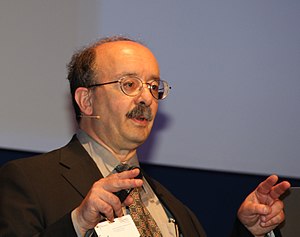
Amory Bloch Lovins (born November 13, 1947) is an American environmental scientist and writer who has worked in energy policy and related areas for four decades. He is Chairman and Chief Scientist of the Rocky Mountain Institute. He was named by Time magazine as one of the World's 100 most influential people in 2009.
Lovins has promoted a "soft energy path," including energy efficiency, the use of renewable energy, and localized energy generation. In the 1990s, his work with Rocky Mountain Institute included the Hypercar, an extremely fuel-efficient car.
He was married to Hunter Lovins, also a respected writer, as well as a lawyer, forester, and social scientist. They separated in 1989.
In 1982, he and Hunter Lovins founded Rocky Mountain Institute in Snowmass, Colorado, to foster efficiency in natural resources use and sustainable development.
Soft and hard energy paths[edit | edit source]
Lovins has described the "hard energy path" as involving inefficient energy use and centralized, non-renewable energy sources such as fossil fuels. One of Lovins' main concerns was the danger of committing to nuclear energy to meet a society's energy needs, due chiefly to what he considered its poor economics and high risk of fostering nuclear weapons proliferation.
Energy efficiency and the "negawatt revolution"[edit | edit source]
Energy efficiency represents a profitable global market. Lovins explains that progress in converting to electricity saving (and thus cost-saving) technologies has been slowed by the indifference or opposition of some utilities. Also, that many electricity-using devices are purchased by people who won't be paying their running costs and so have little incentive to pay for efficiency. Many customers also "don't know what the best efficiency buys are, where to get them, or how to shop for them".[1]
Selected writings[edit | edit source]
Books authored or co-authored by Amory B. Lovins, or which include a foreword by him, include:[2]
- World Energy Strategies: Facts, Issues, and Options London: Friends of the Earth Ltd for Earth Resources Research Ltd, 1975. 131 p. ISBN 978-0884106012.
- Soft Energy Paths: Towards a Durable Peace San Francisco: Friends of the Earth International, 1977 231p. ISBN 0-06-090653-7
- A Golden Thread: 2500 Years of Solar Architecture & Technology (1980) ASIN: B000MWEXMC
- Least-Cost Energy: Solving the C02 Problem Andover, Mass.: Brick House Pub. Co., 1982 184p. ISBN 978-0931790362
- Brittle Power: Energy Strategy for National Security (with L Hunter Lovins) Andover, Mass.: Brick House, 1982 re-released in 2001. 486p. ISBN 0-931790-28-X
- Consumer Guide to Home Energy Savings (1991) ISBN 978-0918249098
- Factor Four: Doubling Wealth - Halving Resource Use: A Report to the Club of Rome (1997) ISBN 978-1853834073
- Natural Capitalism: Creating the Next Industrial Revolution (2000) ISBN 1-85383-763-6
- Small is Profitable: The Hidden Economic Benefits of Making Electrical Resources the Right Size (2003) ISBN 1-881071-07-3
- The Natural Advantage Of Nations: Business Opportunities, Innovation And Governance in the 21st Century (2004) ISBN 1-84407-121-9
- Winning the Oil Endgame: Innovation for Profit, Jobs and Security (2005) ISBN 1-84407-194-4 (Available Online in PDF)
- The Essential Amory Lovins (2011) ISBN 9781849712262
Notes and references[edit | edit source]
- ↑ Amory B. Lovins. The Negawatt Revolution Across the Board, Vol. XXVII No. 9, September 1990, pp. 21-22.
- ↑ The International Who's Who 2011, 74th edition, Routledge, 2010, p. 1259.